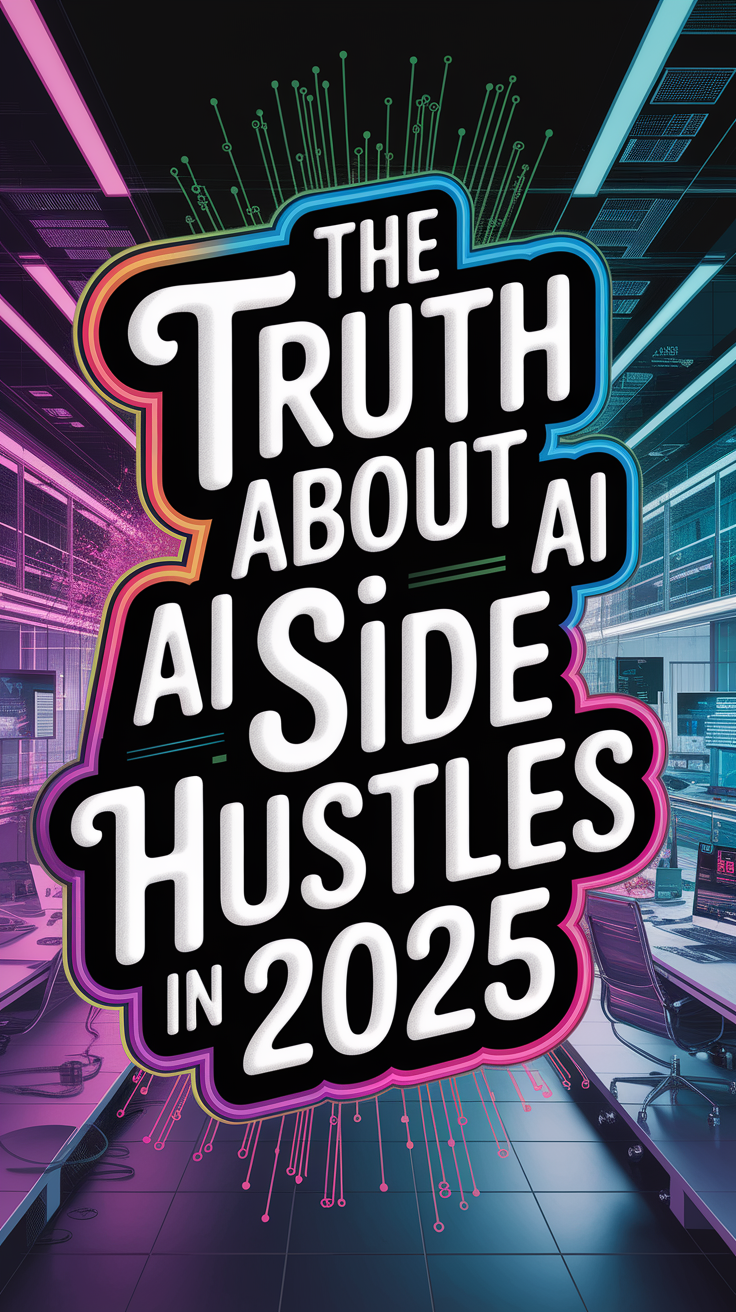My friends, or maybe strangers on the internet who happened to click this link (if that's actually possible), welcome to a deep dive into a topic that's skyrocketing past everything else: AI Side Hustles. Yes, I mean "side hustles" – those clever, unofficial gigs that run parallel to your main job, or let you ditch the soul-crushing 9-to-5 for good. We are, quite literally, talking about Artificial Intelligence doing things that AI wasn't supposed to do just a few short years ago.
And here's the thing? A lot of noise is being made. Blog posts, tutorials, YouTube videos are popping up faster than you can say "machine learning." People are claiming AI can automatically make you $10K a month creating passive products overnight. I've seen everything from "Build a $1M Business in 3 Months with ChatGPT" to stories of simple writers somehow booking $20,000 worth of freelance work in a weekend.
The Fizzling Hype Bubble
Okay, let's call a spade a spade. There's been a frenzy of hype surrounding artificial intelligence. Remember all the AI conference keynote speakers who sounded like they were reading from the same teleprompter about transforming every single industry? It felt almost out of control, like tech bros channeling a spirit animal that happens to be a robot. Venture capital poured billions into AI companies with massive valuations based largely on assumptions, not always tangible returns.
This initial wave produced some groundbreaking tech – the massive language models we interact with today are direct products of that era. But for average people looking to make real money with AI, a lot of what you see online is either snake oil salesmanship wrapped in clever marketing copy, or genuinely hopeful over-optimism. The "Truth," as I intend to share here, needs to cut through that noise and give you a grounded, realistic, somewhat opinionated look at where AI side hustles stand in the year 2025.
It's tempting to think AI will solve *everything* and instantly grant you financial freedom just by feeding it prompts. Spoiler alert: It's not that simple. AI is a powerful tool, sure, brimming with potential. But it's still a tool. It doesn't operate on the principles of human motivation, possesses no entrepreneurial spirit, and definitely doesn't have a heartbeat to commit to deadlines. Deploying it effectively for a side hustle requires strategy, effort, and yes, sometimes hours spent poking around trying to figure out *what the hell this thing even does* aside from spitting out Shakespearean poetry about the stock market.
My own perspective, born out of managing a household (divorce, three kids, bills piling up like... let's not go there)... I see both the incredible potential *and* the significant pitfalls. This isn't a simple get-rich-quick story. In the context of 2025, after several years of experimentation and seeing what *actually* works, I'm here to tell you: This "revolution" is real, but it favors people who are prepared, adaptable, and willing to put in solid work hours disguised as "AI power."
Why Now? Why AI Side Hustles? The Fundamental Shift
So, why all the fuss about using AI for side income *now*? There's a confluence of factors that have converged to make AI-driven side hustles not just possible, but increasingly relevant:
- Pervasive AI Tools at the Masses' Fingertips: Gone are the days (probably) of needing a supercomputer cluster to train anything. Services like ChatGPT, Prompts (Actively seeking funding round... might have used it? Wait, no, the domain is taken... point is, text-dreaming AIs), Stability AI (Image generation), and others, many with free tiers or low-cost subscriptions, have lowered the barrier to entry dramatically. You don't need a PhD from Cornell or Stanford to play.
- Growing Need for Conquerable Tasks: Let's face it, life is full of mundane crap. Modern work, too. We need help finding things, summarizing endless Slack threads, creating repetitive content, making initial contact without sounding like a robot, translating texts, or even something as seemingly simple as figuring out the optimal checkout time to avoid the drive-thru line using AI optimization techniques (Okay, maybe that last bit is an exaggeration). AI steps in to automate bits and pieces, making our side hustle efforts (and main hustles) feel slightly easier.
- Value Proposition Shift: The core idea behind many AI side hustles is leveraging these tools to deliver value faster or more cheaply than ever before. It's about shifting from a model of ownership and physical interaction to a model of curation and facilitation powered by AI. Think less "create a beautiful website selling artisanal soap" and more "use AI design systems to generate multiple font variations and color schemes instantly, helping clients find their brand voice in minutes."
- Edge from Information Overload: In a world drowning in data (and misinformation), AI can help cut through the noise. It allows individuals to offer services that synthesis, clarify, and act upon information in ways previously impossible or requiring specialized expensive skills.
- Financial Prudence (Even at $1 Trillion): While AI companies raise billions, the individual side hustle focuses are often on finding ways to monetize time more efficiently. If AI can help you wise up, write a report, or ghostwrite an ebook in a few hours instead of 20, that's savings *and* income potential.
But First Things First: What *Exactly* Are We Talking About?
Before we jump into the exciting possibilities (and the pitfalls), let's define what constitutes an "AI side hustle" in this context:
An AI side hustle is any income-generating activity (or complementary set of activities) that relies **significantly and non-trivially** on using artificial intelligence tools or platforms to accomplish key tasks.
This includes, but is absolutely *not* limited to:
- Using AI to draft and polish content (articles, social media posts, email sequences).
- Employing AI tools for research and information gathering/expediency.
- Generating ideas, scripts, or pitches for creative projects using AI.
- Leveraging AI for automating customer service interactions (within the scope of the gig).
- Using AI image generators to create graphics and visuals.
- Building simple web applications or services that utilize AI APIs for specific functionalities (e.g., basic sentiment analysis for reviews, predictive chatbot replies).
- Creating/tailoring personas or profiles for marketing campaigns via AI prompting.
The crucial point: AI has to be doing the heavy lifting. "I used ChatGPT to write my occasional Instagram caption" might save you 2 minutes once a month – that's probably not a full-time job. But consistently feeding prompts that *directly* lead to a product you sell (without massive human rewrites/editing) or conducting client interactions *closely monitored by the human running the prompt pipeline* is playing with fire and leaning far into the territory where the automation is minimal and the human input is maximizing.
Understanding this distinction is vital for setting realistic expectations. It's about AI augmenting you, not entirely taking over the gig overnight. Remember, the tools are still dumb in a way – they require clever human direction to achieve desired outcomes.
Kinds of AI Side Hustles Bubbling Away (Near) Now
Let's paint a picture, because pictures help us remember more than dry lists. Imagine pixelated avatars representing different hustle types, zooming across a screen like a technologically enhanced, less-cancelable reality TV show:
The Hyper-Personalized Service Provider (Research Wizardry)
And we have Brenda, the mom of three who also works a day job. But wait, Brenda is now Brenda, the AI-powered "Research Agent." What does she do? *Deep breath.* She uses AI tools extensively to analyze vast amounts of data. Think: comprehensive market research for a startup based on publicly available data, competitive analysis for a local business, or synthesizing information from thousands of news articles, white papers, and social media threads to help someone draft a business plan. Cleverly prompting the AI to then format that research into visually appealing, easy-to-digest reports (good luck finding a beautiful template via Canva...) makes it a service.
Why this might work (N.B.: Get your inner critic comfortable for a few more words.): This offers speed and volume that humans can't match easily. Analyzing 500 research papers used to be a PhD student lifer; AI can chew through them while Brenda sleeps. Specialized databases, APIs, and AI summarization tools are key enablers. The "Truth": Highly tedious, requires strong analytical skills to verify outputs, data sourcing is crucial and often messy.
For you: Can you find a niche where large amounts of data exist but are hard to synthesize for common business/individual needs? Think local economic development data, specific marketplaces details comparison, complex patent landscapes for budding inventors?
The Content Creation Dynamo (Spinning Wheels into Words and Pixels)
Step forward Marc-Édouard, recently arrived from Haiti, now a skilled freelance Content Creator Specialist. Forget ghostwriting where he's almost entirely invisible. Marc-Édouard is using AI as his main "thinker" but adding layers of human creativity. He offers:
- Niche-specific blog articles (prompting for SEO copy then editing)
- Social media content calendars generated by AI but customized by him
- Marketing copy and ad copies drenched in specific personality traits clients want – prepping a huge volume quickly that he then polishes
- Branding: AI image generation combined with human design touch/aesthetic understanding
The hustle leverages AI's capacity to generate initial text/prompt ideas/images while the human provides context, tone, refinement, and ensures quality *for sale*. It's less "AI writes" and more "Client wants French Revolution vibe for their SaaS startup blog? We use AI to brainstorm relevant historical parallels *in French* and then Modern French journalist style editors do the synthesis."
Why this might work: Content is king (or at least, is relevant). AI accelerates capacity. Platforms like Tallbird or Bard might *technically* help write, but the unique voice, customization, editing, and marketing strategy make them work.
For you: What are you exceptionally good at communicating? Can AI help efficiently scale a specific content niche you have talent in?
The Subtle Image Manipulator (Visual Alchemy)
Maria, the graphic artist, saw a friend struggling to produce basic marketing graphics because they lacked design skills. Maria isn't designing entire brand identities *from scratch* using pure AI (that's complex and imprecise). But she sees gaps: needing simple but consistent icons for a presentation, requiring custom visuals for social media posts, or needing minor edits to stock photos.
She builds workflows where she uses AI image generators (Stable Diffusion, Midjourney) to generate component parts, remove backgrounds via Remove.bg (supported on my version? Not necessarily...) or similar AI tools, or create variations of a logo theme. The human oversight is crucial – marrying parts, ensuring brand guideline compliance, tweaking colors, adding text overlays manually.
Why this might work: Design skills are often undeveloped or costly to hire. Quality AI tools enable basic deliverables that look better than before.
For you: Do you understand basic design principles (even if you have no formal training)? Can you identify where AI tools can fill specific visual gaps?
The Productivity Oddity Coach (Not a Life Coach, More a Task Magician)
This one could be John, the Amazon Prime Day-obsessed dad who decided to use his efficiency obsession into a side hustle. How? By teaching individuals (or small businesses) how to use AI *systems* to increase productivity, automate tasks, or optimize workflows for *their* specific needs.
Think coaching focused less on mindset and self-talk (wait for that guy to call you out on your weak points) and more on practical application: "Let's use ChatGPT with Pandoc + this script I built using LangChain to draft, format, and proofread your client proposals *in half the time*." Less fluff, more utility hacking using AI.
Why this might work: AI automation is still a nascent field with much trial and error. Those grasping it early can offer coaching to a niche audience looking to understand how the tools work and how to implement a system.
For you: Are you the kind of person who intensely analyzes systems and seeks efficiency? Can you document workflows combining AI tools in novel ways?
The Virtual Assistant Hired to Dream (Persona Crafting)
Sarah, working from home to support one main job, sees a gap: small businesses need help getting on Etsy or building a Shopify store with consistent brand voice across listings and marketing messages.
What she offers is AI-guided persona development. "Tell me about your target customer – maybe prompt ChatGPT to generate 5 persona profiles using that detailed questioning from Blueprint Academy (if folks read that course)... Then use AI-image-generation services via PromptHero based on Fantasy Cartography style prompts (like "a charming rustic artisan, smiling slightly, outdoors, indie, natural light, 4K --ar 1:1") to represent that persona, then help you name your products, craft the unique selling points..."
She's not creating the products, she's prime-tuning the perception and presentation.
Why this might work: E-commerce is huge and hasn't universally embraced AI yet, meaning gaps exist for services that bridge human creativity with AI efficiency.
For you: Do you see non-obvious ways an average Amazon seller can leverage AI? Are you skilled at identifying visual cues or stylistic directions?
The Emerging AI Prompt Engineer Short Order Cook
Maybe this is for someone with slightly more technical understanding (or a willingness to learn quickly and pay for courses on Udacity, Coursera). This isn't about writing code in their basement to create a generative adversarial network, but rather about designing the *optimal prompt system* for a specific task.
Think: using multiple AI services (e.g., automated YouTube video editing workflow using a fresh iterative approach combining Claude, Jasper, GPT, Gemini, Ben's AI tools, and a specific AI executor), or optimizing prompt engineering techniques for translating content between tone registers, or for generating the perfect resume formatting.
It's less "AI build me a thing" and more "AI, figure out the ANSWER TO THIS with EXPERT LEVEL REFINEMENT, following this framework (maybe using LangChain type structures conceptually)."
Why this might work: Complexity begets plumbing services. AI systems are notoriously fussy about input and output formats; someone who *just gets it* and provides guidance/configurations can charge a premium.
For you: Where do you get frustrated by inefficient AI interaction loops? Can you map complex tasks or sequence prompts effectively?
How Will You *Actually* Make Money With This Stuff?
Alright, hustle defined, let's talk cash. Where does the dollars come from? This is the million-dollar question (valuable). The primary mechanisms for monetization in this space are:
- Time-for-Skill Exchange: You trade your mental (or physical, if automation complements manual tasks) labor for income. AI speeds up certain steps, allowing you to be "more productive" and offer cheaper (per task) or more volume-based services. Think standard gig economy models (Fiverr, Upwork, etc.) but boosted.
- Value Extraction from Information/Data: Premium reports, analysis packages, curated content libraries built using AI assistance and sold to clients who need insights.
- Buildable Asset Creation: Using AI to rapidly prototype small digital products that can be iterated upon and potentially "owned," like simple AI-powered tools wrapped as a widget or basic applications automating specific processes for clients (think landing a niche coaching or SaaS business).
- Access Fees or Subscription Models: This is trickier for short-term side hustles, but offers long-term potential. Could you offer an AI-powered summary service where clients pay a monthly fee for specific reporting as they come faster?
Putting It Into Practice - Example Monetization Scenarios
Let's revisit Brenda from the Research section:
Strategy: Deep Competitive Analysis Reports.
Process: Client provides their website URL or asks to analyze a competitor's market share/strategy.
Step 1: Prompt ChatGPT/Claude to identify key product/service offerings, unique selling propositions (USPs), target demographics, customer reviews, site structure, etc., by crawling summarized data (using web scraping tools that AI can call).
Step 2: Verify information, add context, analyze gaps/strengths trends.
Step 3: Generate a visually appealing report (using AI tools like Canva features prompted via Bard/GPT, plus manual design touches).
Step 4: Deliver report. Charge per competitor analyzed or per report ($300-$800).
The hustle leverages AI for parts of research and report foundation generation while the human adds expertise, analysis, and polish.
Tech Stack Mix-up
Here's a thought experiment to understand the blend:
| Hustle Type | Core AI Tools | Keyword Leverage | Intellectual Property (IP) Opportunity |
|---|---|---|---|
| Competitive Analysis Reports | ChatGPT/Claude (Persona), Web Scraping/Automation Scripts | SEO-Optimized Research, Data Visualization | Premium Data Packages, Structured Database Analysis |
| Language Translation | DeepL / Google Translate (Fine-tuned via API?, Prompt Libraries) | Niche Segments, Tone Matching Services | Termbank Management Tool Integration |
* Data Visualization_PLATFORM_TYPENAME might involve tools like Observable, PowerBI, Plotly, or custom scripts using Python libraries. Tone Matching used tools like Otter.ai for transcriptions, plus AI tools to generate polished versions, then Clarity's API/similar to export audio files. Termbank is a concept using manual lists enriched via AI research.
Alternatively, consider combining AI image generation and prompt engineering to build a unique package of AI-assisted branding or social content. This way, your time is slightly more limited in writing/editing/prompting than traditional AI writing gigs.
Solid Advice: Tools to Actually Use (And Where to Buy Affordable Headwear)
Okay, sound of crickets in the desert? Turns out a disturbing percentage online AI side hustle tutorials might rely heavily on "ChatGPT can do everything, like a magical genie manifested from the screen." Bah. It takes a huge variety of tools, and you need to pick your battles. Here's a peek at the ecosystem (and yes, I've prioritized linkable product references where they serve the explanatory point directly):
Star Text AIs You Should Know
Different AIs have different strengths.
- ChatGPT (OpenAI): The granddaddy, multimodal? Kinda, slowly getting there with image. Good for deep text analysis, brainstorming, complex instructions. Good basic prompt engineering manipulation. Use the API for stuff like generating tags for Amazon product listings *constantly*.
- Claude (Anthropic): Cannily good at long-form summary and human nuance. Excellent task comprehension longer prompts. Useful for summarizing documents, deep diving into research, and less for creative flair. API possibilities, but open source version is more of a conversation tool.
- Bard (Google): Google's attempt, indexing user knowledge strongly. Good search/synthesis using linked search queries. More basic generation. Google Employee sunsetted? Wait, "Bard" is more current under Google, try variations (Gemini might be the next evolution).
Dreaming & Designing
For visuals:
- Midjourney or Stable-Diffusion Powered Ones (RunwayML, Replicate): Creative image generation. Not just Day-of-pic memes, but charts, infographics, character origins.
- Bing Image Creator (DreamStudio API via Bing): Another way into non-Claude image generation, integrate with Canva-like interfaces sometimes.
- Adobe Firefly: Design tools? Check. Good integration with Adobe Creative Cloud, but requires subscription.
Automating Text Tasks, Maybe
API-based stuff:
- LangChain: Connects the dots between different AIs, creates pipelines. Need to buy a book if this is your niche?
- Bing Copilot API: Throw entirely prompt-engineered tasks.
- Slack Intents: AI agents for communications?
For AI Prompt Engineering Stuff
This is less a tool and more a methodology:
- PromptHero: Curated prompt marketplace? Or find amazing prompts for editing or research.
- LlamaIndex: Tried to help build agents?
Face it, many tools lack polish or didn't update their pricing lately. You might do side hustle tasks by hand via Amazon's meticulous standards. Productivity tooling for AI work?
A common query I see is "How to use AI to write better code." That makes sense, engineers just want faster bug fixing. Self-admittedly less strong at design, butแนวทาง industrious prompting could yield usable stuff. Do you need an IDE? Not necessarily, just VS Code plus API access. Start with a boilerplate. Maybe use GPT to wire prompts around preexisting commands. But coding demands rigorous supervision by a human brain.
Mistake Hunter! How NOT to Get Stung by the AI Hustle Beast
**
I still remember the look on my nephew's face, barely fifteen, trying to sell artisanal succulents he dug up from his backyard. He asked me a AMAZON CLOTHING ITEM...] just kidding. The gist is: novice side hustlers often lean naive. I thought hunting down the iPhone 4 on Amazon used an entirely different life system when I first tried.
The cable version in 2025 is no different. Here are cardinal sins to avoid when using AI for side income:
Plagiarism: Why Pointing a Finger at a Copyable Prompt is Sensational
This is the swamp you wade into if you are careless. AI CAN COPY, TRULY – and it copies for others too. Platforms like
GPTZero (Is GPTZero available?)
Or similar AI detector tools
show you can game the system. So, if you are a top copy-paste artist, you can use AI-assisted prompt engineering to sometimes spot generative outputs that look very familiar and engineered...
Legality aside (seriously, check terms), your excellent brand voice will burn out if you use low-effort copy that looks like machine spam you found online. The main takeaway: Originality isn't dead, lose some sleep planning unique inputs and adding your own fat.
The Lazy Indefinitely Long Wait Game
Yes, AI spits out words fast, but what are those words? Is AI's output inherently superior? Probably not always, and in any case, useful chain links require subsequent editing or verification. The common mistake is trying to make an AI do 100% of your task *on the first try*.
That usually means you have to buy a birthday gift for your best friend via the clock shop.
Repeating the "Wizard" narrative: Providing the core idea/human intervention is part of the delivery process. AI tasks requiring minimal follow-up are often *overhyped* rather than truly "get rich quick".
The perfect hustle: Use AI to refine sketches to professional quality in a few minutes, have a complaint, then tune the prompt to get the exact bang you want assuring human deliberateness.
The Landlord Fallacy (Moving Towards the Plan)
Which might be the danger truly trip-ups are saying "AI will replace my work entirely." They don't. Not in 2025, not soon. AI might replace some tasks, but not the human judgment about when *to use* the AI.
- Sometimes the AI makes the best call.
- Sometimes you need to override it.
- Sometimes you need to fail on the AI to find the right human workaround.
Your role is to find that balance. One common error: relying entirely on AI capes and firing yourself upon clicking "regenerate ad copy". No joke.
Beware of Hashing Out Licensing Terms
Use your smart phone unless
Some AI tools have serious terms of use. Generating commercial content might be explicitly forbidden, or open to licensing fees. Always read the fine print before you go all in on an important side hustle attempt. DeepMind Chef does that, Google Gemini might eat cash pdfs.
Overpromising Cliché Starts
This is blatant: "Use our one-click AI side hustle system, start making $10k a month!" This is almost always exaggeration, designed for users to buy a product rather than understand the mechanics. There have *got* to be genuinely rewarding side hustle opportunities without the initial 망상 (Experience of getting a type of unrealistic vision prompted by media narratives) snare.
Ideas for Post-Carrie Underwood Career Change (Moving On)
In the summer heat, or maybe just a new winter, what happens? The hustle phase ends. You either land a full-time gig in the AI space (unlikely via marshmallow-clicking), you are smarter for the work, or you scale back. What have you learned?
Business Building With Backbone
Think about it: once you win a pizza delivery spot on WordPress with your annotated example or personalized proposal, how can you barter, internalize, or maybe build a side hatch site doing the same thing.
If you've mastered managing an existing AI tool chain, you could build a service around customization, integration with your own website, or ongoing maintenance.
Example: You offer dynamic SEO content writing services for mid-sized businesses based on specific key phrases.Master prompt recipes for database columns.
This offers recurring revenue, a sense of accomplishment, and builds your own "brand narrative" that makes you feel slightly less like a golden retriever lost in a toaster commercial.
Skilling Up: AI or Not, This Technique is Reinventing Specialization
This might be the real prize. Deep expertise in some complex field (say, regulations for AI used in a specific healthcare niche) is complex. Now, with AI brains, maybe you can spend less time scanning medical journals and focus on synthesizing complex insights... but you still need the human brain to do that.
Focused mastery mixed with AI assistance lets you provide practical solutions that combine human wisdom with machine efficiency.
Investing in specialized, nuanced knowledge remains crucial, even if the tasks are facilitated by AI. You can be the tax accountant who uses AI to compile data before preparing returns, saving time while getting more complex inputs correct.
Your specialized skill *enhanced* by AI can be your edge.
Anyone Got a Hobby-Shop or Services Idea?
This is broad, but true: if you can master one AI task (e.g., summarizing meeting transcripts, generating nonfiction book outlines, enhancing customer service chat logs), you can integrate it into side gigs or freelance projects.
Think: pieces generating reports from any raw text data source your client provides. Or helping non-tech people understand and navigate AI tools themselves.
Go forth, disseminate the knowledge, let's get this word out there, and like your ideas, completely copyright the future, but with actual proofreading.
A Few Final Thoughts on This Wild AI Rollercoaster
In 2025, AI side hustles aren't a magic wand gracing us from a fairyland tale; they are a powerful, real-world amplification tool. Like any amplification, they'll double your efforts intelligently when used correctly. But they won't fly *you* to them, probably only your luggage at airport security checkpoints.
The "Truth" is: Success lies in finding the right blend of your skills, creativity, persistence (the good kind), and using AI effectively to automate tactical components. Not every hustle will work; many will feel like chasing your tail around the living room. But dismissing it entirely? Well, that would be a spectacularly inefficient stance.
AI represents an era-shifting shift in the landscape of work. As internet denizens, we'll either adapt and use it, or hope some kind of digital equivalent of the printing press bypasses us. The side hustle is just the beginning. It teaches discipline, introduces novel ways to see value, and maybe, just maybe, helps you pay off that strategically important loan the mortgage or the dental procedure deserves.
This journey requires patience, learning, and product-style editing. If you download that found object book tonight you look sensible, get the better amplifier...
Real Questions Asking You Right Now
In the spirit of debate, let's go out and turn the phone ring search light on yourself...
- What perceived annoyance in your current life tasks screams "AI sprint through this!" to you?
- Do you have the tenacity required to learn how a specific AI tool works to the point where you can chain it into useful patterns?
- What quality are you though, because ultimately these aren't side lines, they're strategy fields?
- Have you irrational fear of letting an algorithm disrupt your sleep patterns? Posing as helpfulness?
- What's one tiny AI side hustle task you could test in the next two weeks using free tiers?
Grab your keyboard, access your AI partner and reply in the comments below. Quench your thirst for knowledge we all need in this wild frontier. Until next time!
Learn more about our iNthacity special programs: our exclusive 2, no, 5-stage "Become a Digital Citizen" pathway ("Shining City on the Web"). Let the community help you conquer these opportunities!
Disclaimer: This article may contain affiliate links. If you click on these links and make a purchase, we may receive a commission at no additional cost to you. Our recommendations and reviews are always independent and objective, aiming to provide you with the best information and resources.
Get Exclusive Stories, Photos, Art & Offers - Subscribe Today!

























Post Comment
You must be logged in to post a comment.